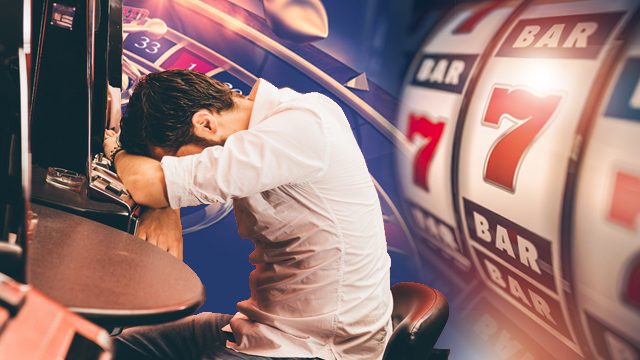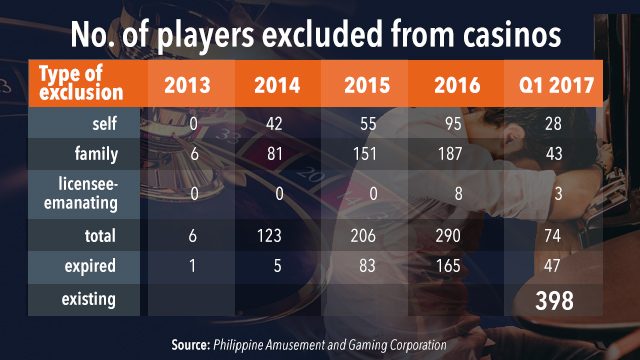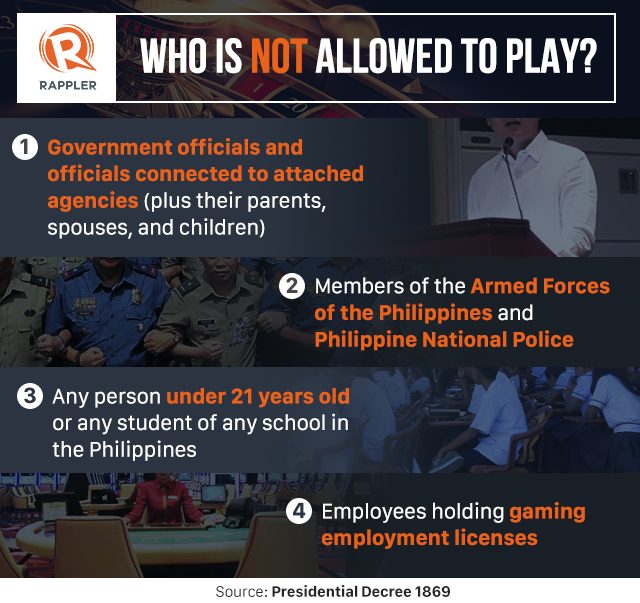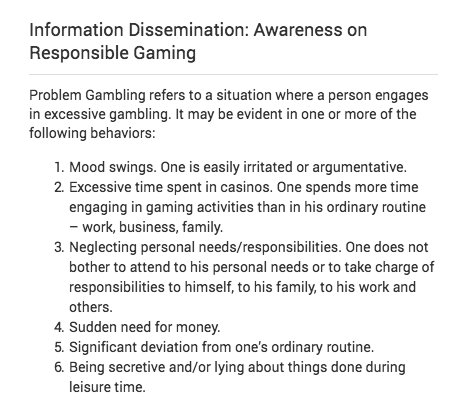SUMMARY
This is AI generated summarization, which may have errors. For context, always refer to the full article.

MANILA, Philippines – The allure of big payoffs, clicking sound of chips, and perks like free drinks entice many people to gamble. For some, that seductive environment can be dangerous, leading to depleted savings, huge debts, and jeopardized futures.
Take the case of Jessie Carlos, a former Department of Finance (DOF) employee who was sacked because of issues with his Statement of Assets, Liabilities, and Net Worth (SALN). Past midnight on June 2, the 42-year-old “longtime guest” of Resorts World Manila in Pasay City fired gunshots, set ablaze gaming tables, attempted to steal P130 million worth of casino chips, and then committed suicide. The fires he triggered killed 36 people, who were trapped and suffocated inside the casino complex.
Carlos was one of the gamers enrolled in an exclusion program of the Philippine Amusement and Gaming Corporation (Pagcor).
His family turned to Pagcor, asking the gaming regulator to ban Carlos from casinos after he incurred about P4 million in debt to banks, and several other non-bank debts. He and his wife, Jen Carlos, separated as his gambling addiction took its toll.
Carlos fits Pagcor’s description of a problem gamer – a person who has gambled to the “point of no longer having normal control or rational judgment, leading to problems in other areas of the gambler’s life.”
From 2013 to the 1st quarter of 2017, a total of 699 problem gamers were banned from casinos. At present, there are 398 who are still part of Pagcor’s exclusion program, but these only represent documented cases in the country.

When it comes to responsible gaming measures, local casinos are following the minimum standards mandated by Pagcor.
Pagcor, the Philippine government arm that regulates authorized gaming establishments around the country, expects gaming services provided by its licensees to be delivered in a responsible manner.
The gaming regulator ordered licensed casinos to abide by rules and guidelines on responsible gaming to prevent addiction to gambling.
“The responsible gaming program includes training of gaming employees, limited access, probity measures, and advertising guidelines, among others,” Carmelita Valdez, Pagcor assistant vice president and head for corporate communications, told Rappler.
When and how do casino operators provide intervention?
First on the list is the probity measure. It establishes integrity, financial soundness, business ability, and suitability of an individual to be part of a licensed casino’s board of directors. Single proprietors and members of board of directors should file pertinent documents like income tax returns (ITRs), certificates of non-filing of ITR, and passports.
Second is the limited access measure. Some people are prohibited from playing in casinos, pursuant to Presidential Decree 1869 – also known as the Pagcor Charter – as amended by Republic Act 9487 and Malacañang Memorandum Circular No. 8.

Third is the exclusion program, which prohibits problem gamers from all gaming venues or sites. Relatives of problem gamers or they themselves apply for the program in an attempt to go cold turkey.
Pagcor has set up a national database of persons who are restricted from playing in gaming establishments. This database is accessible online to authorized representatives of gaming operators.
For instance, the name of the Resorts World Manila gunman was registered in the database last March 27 after his family filed an exclusion form.
Another measure mandated by Pagcor is the training of management and staff. All licensed casinos should conduct training programs, symposia, refresher courses, and/or seminars on problem gambling for their employees.
Management and staff are taught how to spot a problem gamer, what to do when confronted by one, and how to respond to queries pertaining to the casino’s responsible gaming program. Attendance at seminars is a requirement to maintain the validity of an employee’s gaming employment license.

Pagcor also requires casinos to establish gambling-related complaint resolution mechanisms to address gambling concerns, through helplines (landline or mobile) and internet (email or website).
What are casinos doing?
Casinos must maintain a responsible gaming incident record to ensure that situations are acted upon and that corresponding actions taken by staff to assist people are according to rules. (READ: Casino stocks plunge after Resorts World Manila attack)
Resorts World Manila, City of Dreams, as well as Solaire Resort and Casino are already practicing their own responsible gaming programs, which include information dissemination, assistance to gaming members seeking professional help, and an exclusion procedure.
These 3 casinos have partnered with Life Change Recovery Center, a professional counseling and treatment facility for persons with psychiatric conditions, addictions, or psychological and/or behavioral problems.
Pagcor’s minimum requirements for intervention are addressed on a number of fronts, including financial transactions.
Credit is not extended to players without premium accounts and who are not VIP customers. Banking services located inside gaming areas are limited to providing foreign exchange services only. Automated teller machines are also strategically located to foster responsible gaming practices.
The latest addition is casinos’ inclusion in Republic Act 9160 or the Anti-Money Laundering Act (AMLA). This was only pushed after local authorities were not able to trace the exact location of the $81 million stolen from Bangladesh Bank’s account, citing the Philippines’ strict bank secrecy and weak AMLA as hindrances to reach a meaningful probe. (READ: Hard lessons learned as Senate ends bank heist probe)
Is PH on par with global standards?
Although local casinos are adhering to Pagcor standards, the Philippines seems to be just catching up with the rest of the world.
For instance, Macau’s tight regulations and scrutiny – in contrast to Manila’s lax money laundering laws – made the Philippines an easy destination choice for dirty cash. (READ: How Bangladesh Bank dirty money easily got into PH)
Macau
Macau’s casino industry, another major gaming hub in Asia, is supervised by the Gaming Inspection and Coordination Bureau there and other concerned government departments.
Macau had implemented measures to promote responsible gaming as early as 2008. Every year, it conducts a series of activities that promote responsible gaming.
Casinos there have long been under anti-money laundering regulations. Additional laws also mandate that advertisements do not directly market gambling activity. Only other entertainment and leisure services may be marketed.
Macau also observes exclusion policies where persons under the age of 21 and individuals who have applied for exclusion are banned from entering casinos.
Moreover, the Social Welfare Bureau there has a resilience center where research efforts are carried out and where problem gamers are given access to treatment.
While Macau has been adding new measures, which include keeping daily records and hiring compliance officers, Philippine authorities just recently included casinos in the AMLA.
United States
States in the US set their own regulations and programs on responsible gaming. The legal age for gambling across the US ranges between 18 and 21 years old.
States and operators, such as MGM Resorts International and Las Vegas Sands Corporation, are guided by the American Gaming Association (AGA) Code of Conduct.
The Code of Conduct includes practices such as employee assistance and training, access to helplines and support centers, basic standards, as well as the provision of casino games and casino advertising.
The AGA also funds research efforts and public initiatives of the National Center for Responsible Gaming.
Self-exclusion programs are also in place and may vary from state to state.
Europe
European responsible gaming standards are among the most comprehensive in the world – ranging from research to treatment referral.
The minimum age for gambling in Europe is generally 18, though some countries require gamblers to be at least 21 years old.
Self-exclusion systems and practices are also in place to ensure responsible gaming.
One of Europe’s noteworthy steps is its game design measure. Before launching any new product or service, licensed gaming providers should conduct social impact assessment using a structured assessment process to examine risk factors.
Licensed casinos in Europe should implement effective strategies to minimize the negative impact of these risk factors. The risk factors should be documented so these can be reviewed by the regulator.
Although regulators around the world set up comprehensive measures, it is also up to casino patrons not to let their gambling spiral out of control, like what happened to Carlos, the Resorts World Manila gunman.
As Pagcor chief Andrea Domingo put it, “The state can only do so much.” – Rappler.com
Add a comment
How does this make you feel?
There are no comments yet. Add your comment to start the conversation.